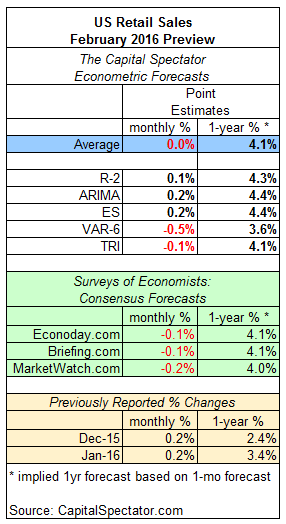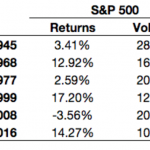US retail sales are expected to remain unchanged in tomorrow’s February report vs. the previous month, according to The Capital Spectator’s average point forecast for several econometric estimates. The average prediction marks a modest decline vs. the increase in the previous month.
The Capital Spectator’s average forecast for February is slightly above three projections via three surveys of economists–projections that anticipate a monthly decline for retail spending. Note, however, that all the forecasts translate into a moderately stronger pace of expected growth for the year-over-year spending rate in February vs. the previously reported annual change.
Here’s a closer look at the numbers, followed by brief summaries of the methodologies behind the forecasts that are used to calculate The Capital Spectator’s average prediction:

R-2: A linear regression model that analyzes two data series in context with retail sales: an index of weekly hours worked for production/nonsupervisory employees in private industries and the stock market (Wilshire 5000). The historical relationship between the variables is applied to the more recently updated data to project retail sales. The computations are run in R.
ARIMA: An autoregressive integrated moving average model that analyzes the historical record of retail sales in R via the “forecast” package.
ES: An exponential smoothing model that analyzes the historical record of retail sales in R via the “forecast” package.
VAR-6: A vector autoregression model that analyzes six time series in context with retail sales. The six additional series: US private payrolls, industrial production, index of weekly hours worked for production/nonsupervisory employees in private industries, the stock market (Wilshire 5000), disposable personal income, and personal consumption expenditures. The forecasts are calculated in R with the “vars” package.














Leave A Comment